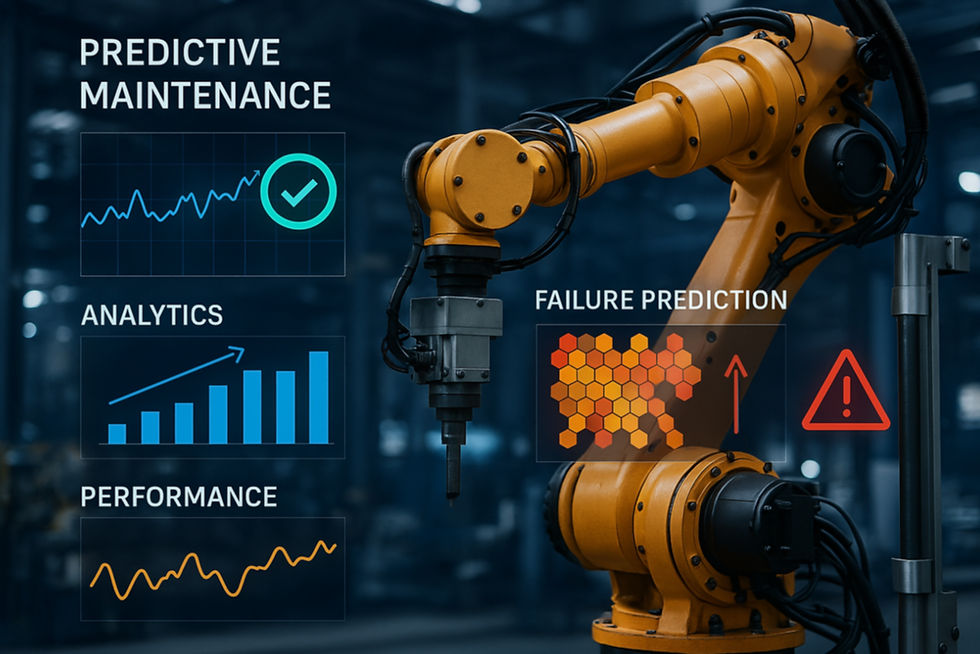Data Governance and Ethics in Smart Manufacturing: Building Trust and Value from Industrial Data (July 2025)
- Adriana Gutierrez, Digital Media Producer

- Aug 1, 2025
- 4 min read

The smart factory of July 2025 is a sprawling ecosystem of interconnected devices, sensors, machines, and systems, generating an unprecedented torrent of data. This industrial data holds immense promise for optimizing operations, driving innovation, and unlocking new efficiencies. However, without a robust framework for data governance and a clear understanding of data ethics, this promise can quickly turn into a liability. For manufacturers, establishing comprehensive strategies for managing, securing, and responsibly utilizing their data assets is no longer optional—it’s a critical strategic imperative for building trust and maximizing value.
The Imperative of Data Governance in Manufacturing
Data governance in manufacturing is the overarching framework of policies, processes, roles, and standards that ensures data is managed as a strategic asset. It addresses critical questions such as:
Data Quality: Is the data accurate, complete, consistent, and timely? Poor data quality can lead to flawed decisions, unreliable analytics, and operational inefficiencies (IBM, Data Governance Trends 2025, May 2025).
Data Accessibility: Is the right data available to the right people at the right time? Breaking down data silos ensures that insights can flow across departments, from the shop floor to the executive suite.
Data Security: Is sensitive operational, intellectual property, or customer data protected from unauthorized access, breaches, and cyber threats? This goes beyond network security to encompass data lifecycle management (Deloitte, Cybersecurity for Smart Manufacturing, April 2025).
Data Compliance: Does the handling of data adhere to internal policies, industry standards, and evolving global regulations concerning data privacy, environmental reporting, and product traceability?
Without effective data governance, manufacturers risk making suboptimal decisions, facing compliance penalties, and experiencing operational disruptions due to unreliable information.
The Rising Importance of Data Ethics
As artificial intelligence (AI) and advanced analytics become more prevalent in manufacturing, the conversation extends beyond governance to data ethics. This involves the moral principles guiding the collection, usage, and sharing of data, especially concerning automation and AI applications. Key ethical considerations for manufacturers include:
Privacy: Ensuring the privacy of employee data, customer information, and even supplier data collected through interconnected systems.
Bias: Mitigating bias in algorithms used for decision-making (e.g., in hiring, predictive maintenance models, or quality control) to ensure fair and accurate outcomes that do not perpetuate human or historical biases (PwC, Responsible AI in Industry, February 2025).
Transparency and Explainability: Understanding how AI systems arrive at their conclusions, especially in critical manufacturing processes, to build trust and allow for human oversight and intervention.
Responsible Use of Automation: Ensuring that data-driven automation enhances human roles and safety, rather than leading to unintended consequences or job displacement without adequate reskilling (World Economic Forum, Future of Work in Manufacturing, 2024).
Integrating data ethics into governance frameworks is crucial for maintaining stakeholder trust and ensuring that technological advancements serve broader societal and business values.
Building a Robust Data Governance and Ethics Framework
Manufacturers are adopting several key strategies to implement effective data governance and ethical practices:
Define Clear Roles and Responsibilities: Establish a data governance council or a dedicated chief data officer (CDO) to oversee data strategy, quality, and compliance. Assign data owners and stewards across departments to ensure accountability for specific data sets.
Develop Comprehensive Policies and Standards: Create clear policies for data collection, storage, access, usage, retention, and deletion. Standardize data definitions and formats across all systems (OT and IT) to ensure consistency and interoperability.
Invest in Integrated Data Platforms: Implement scalable data lakes, data warehouses, and integration platforms that can consolidate data from disparate sources (ERP, MES, IoT sensors, CRM) into a unified view, making it accessible for analysis while maintaining security (Gartner, Data and Analytics Trends 2025, March 2025).
Implement Robust Security Measures: Beyond basic cybersecurity, focus on data-centric security, including encryption, access controls, anomaly detection, and regular audits to protect sensitive industrial data at rest and in transit.
Foster a Data-Literate and Ethical Culture: Provide training for employees on data governance policies, security best practices, and ethical considerations. Cultivate a culture where data is respected as a valuable asset and used responsibly.
Embed Ethics by Design: Integrate ethical considerations into the design and deployment phases of new data-driven technologies and AI solutions from the outset, rather than as an afterthought.
The Strategic Upside: Trust, Value, and Resilience
Proactively managing data governance and ethics delivers tangible strategic benefits for manufacturers:
Enhanced Decision-Making: High-quality, reliable data leads to more accurate insights from analytics, driving better operational, strategic, and investment decisions.
Reduced Risk and Compliance Costs: Minimizing data breaches, ensuring regulatory adherence, and avoiding costly penalties and reputational damage.
Operational Efficiency: Streamlined data flows reduce manual efforts, eliminate redundancies, and improve automation reliability.
Innovation and Competitive Advantage: Trustworthy data provides a solid foundation for developing new data-driven products, services, and business models, fostering innovation with confidence.
Stronger Stakeholder Trust: Demonstrating responsible data stewardship builds confidence among customers, investors, employees, and regulators, enhancing brand reputation and long-term viability.
Conclusion
In July 2025, as manufacturing continues its rapid digital evolution, data is undoubtedly the new industrial currency. However, its true value can only be unlocked through disciplined data governance and a commitment to data ethics. Manufacturers who prioritize these foundational elements will not only secure their operations against emerging risks but will also cultivate a culture of trust, drive profound efficiencies, and gain a decisive competitive advantage in the global market. Responsible data stewardship is, therefore, not just a technical challenge, but a strategic imperative for the future of manufacturing excellence.





